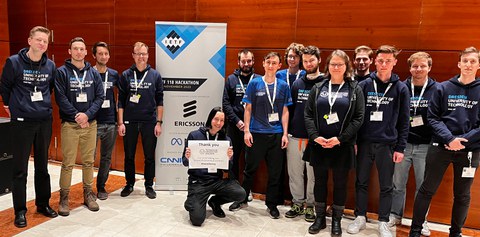Nov 21, 2023
Research-oriented teaching at the Faculty of Computer Science

The team of the Faculty of Computer Science at the 118th meeting of the IETF in Prague
As part of the complex practical course "Open Communication, Open Source for the Internet", eleven students from our faculty took part in the 118th meeting of the IETF in Prague.
The Internet Engineering Task Force (IETF) is an international organization that standardizes all important technologies for the Internet. The IETF kicked off with a hackathon. Among the 520 hackathon participants and the more than 1000 IETF registrants on site were four groups from the practical course organized by Prof. Matthias Wählisch, which is offered for Bachelor's, Master's and Diploma courses. Doctoral students also presented their work.
Alexander Männel: "The aim of the IETF is the further technical development of internet standards, for example for the web, email or data routing. At the hackathon, each group presents its results and other participants comment on and discuss them. In this way, everyone benefits from the experience of others." His "Telescope Monitoring" group dealt with the detection of errors in network telescopes.
Technology companies, security experts and scientists from all over the world come to the IETF meeting. "This expert knowledge is extremely important for us," explains Carl Seifert. His group's project "ASPA Support in RTRlib" is working on the implementation of a specification that will help to transport data more securely from source to destination via the Internet. In doing so, they have found potential for improvement for the upcoming standard. "We are still working on optimizing the draft and have been exchanging ideas since the IETF with Rüdiger Volk, former head of routing at Deutsche Telekom, among others."
"High-level CoAP API for RIOT" aims to enable communication for small devices, which are often overwhelmed by the standard protocols. Tim Rieß: "Our design is intended to improve the interfaces in an open source project. The IETF allows everyone to check whether the ideas will also be taken up by third parties in the future."
The "Measuring Transparent Forwarders of the Open DNS Infrastructure" project team is integrating new protocols into a measurement platform that locates servers for name resolution. Such servers are also misused for attacks. Now more open servers can be identified in order to close them down.
Carl Seifert sums up the added value for everyone: "We can actively participate in standardization processes and get to know experts worldwide. The IETF visit is not only an enrichment for our studies, but also an opportunity to take a look behind the scenes of the Internet." The visit was made possible in part by the support of the FOSTER program at TU Dresden, which promotes projects relating to the topic of "Student Research and Research-Oriented Teaching and Learning".
